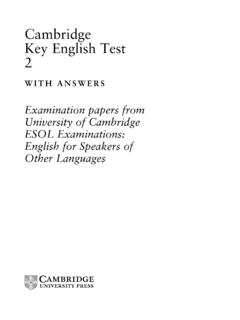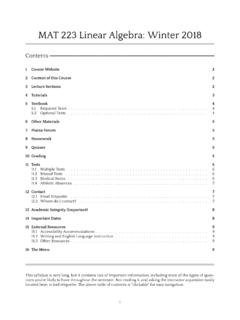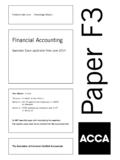Transcription of GGR 112 H1F Geographies of Globalization, Development, …
1 1 GGR 112 H1F Geographies of globalization , development , and Inequality Department of Geography University of Toronto First Summer Session (12 May 27 June 2014) Tuesdays & Thursdays, 12 noon 2 pm, Wilson Hall (WI) 1016 INSTRUCTOR Teaching Assistant(s) Lia Frederiksen* Leqian Yu Office SS 5068 Sujata Thapa-Bhattarai [AT] Office Hours: Tuesdays, pm * Please direct all email about the course to the instructor COURSE GOALS Throughout this course we apply a geographical approach to global economic integration, international development , and transnational relations of inequality. We will focus on important processes to explore how and why people s lives are linked across places and histories. We proceed from an understanding that all accounts of globalization , development , and inequality are the result of particular assumptions. We extend this understanding with the knowledge that designating places as developing and Global South are geographic concepts that do political work and have real, material effects.
2 Therefore, we pursue four main goals expressed in the following pivotal questions: How do specific ideologies, theories, and practices underpin distinct perspectives on development and globalization ? Whose visions of the world structure how states, societies, people, and places are constituted as subjects and objects for intervention and measurement? What colonial histories, geopolitical relations, and geoeconomic dynamics are continuous with contemporary inequalities? In what ways, and with what effects, are economic growth, inequality, and markets related? Course Objectives By the end of the course, we will have at least a basic understanding of: Definitions and discourses of development , globalization , and inequality that characterize the past century of global economic integration. How people s everyday lives are located amid local, national, regional, and international forces and challenges.
3 The roots, common (mis)conceptions, and political implications of global economic integration and projects of development . Ways to critically assess and rigorously question, as geographers, the ideas that influence our world s economies and societies today. 2 COURSE REQUIREMENTS The most important requirement for this course, as with any course that deals with the politics of difference and representation, is that we approach all readings, lectures, and especially one another with patient and open minds; a willingness to see from new perspectives, to explore the unfamiliar, and to honestly challenge our own assumptions. Specifically, remember to: Come to every class prepared to pose questions, discuss the material, share thoughts, and engage in informed conversation about topics in readings and lecture. Complete all of the assignments and readings before lecture.
4 Bring your textbook, reading notes, and prior lecture notes to each lecture. Re-read the course syllabus each week and review assignment guidelines carefully when beginning and before submitting assignments. Please be aware of the needs of others we are sharing the classroom space, and should resolve to be considerate toward one another. Web browsing, text messaging, or other forms of electronic distraction during class detract from learning outcomes. Just as some independent musicians now instruct their audiences to experience live concerts without the mediation of technology and screens (which has been shown to impede one s memory of an event anyway) in order to fully live the music experience, the same is true in the classroom. We can all strive to keep distractions to a minimum, both for our own benefit and out of courtesy to one another. Laptops can be powerful tools for learning when we use them with purpose; cell phones are almost never necessary in the classroom.
5 If you are managing an urgent personal or work matter, you are welcome to quietly and momentarily leave the classroom to use your cell phone. You are always welcome to use translation aids and other practical applications that you need in order to participate fully in the course (for the policy on recording lectures, see Course Policies below). Please think carefully about what uses of technology directly support you to focus and engage, and which distract or isolate. 3 ASSIGNMENTS & EXAM ALL assignments are due in hard copy at the beginning of the lecture period at pm on the due date. Any assignments submitted after the start of lecture will be subject to late penalties (for the policy on late and missing assignments, see the Course Policies below). Focus Country: You will choose a focus country from a list provided on the course website, and you will identify a specific development or globalization intervention (a project, process, or policy) in your focus country.
6 This country and the intervention will form the basis of your course paper , and your specialization in your focus country will help you to interpret and deeply understand the course in a grounded way. Intervention paper (30%): A 3-5 page paper in which you will explore a specific development or globalization intervention (a project, process, or policy that is intended to create specific changes to extend development or globalization ) in your focus country. This paper is not a report about the country or intervention. Rather, you will integrate course materials into an assessment that more fully illuminates the justifications, practices, and implications of this intervention. The purpose of the paper is to identify and evaluate discourses, histories, and global/transnational changes that help you to interrogate ideas and assumptions embedded in development projects. You will receive assignment guidelines and the evaluation rubric in class.
7 The paper is due Tuesday, 10 June at the start of lecture. Debt & Governance Mapping Exercise (20%) details will be distributed in class and posted on blackboard. You will receive an outline map and list of required map elements, which you will complete by the beginning of lecture on Tuesday, 27 May. Reading toward Writing Exercises (10%): Throughout the course, you will periodically complete in-class writing exercises that help you to think and write critically about what you read and how you present an argument. Some of these exercises will be more structured and skills-based, forming components of the critical analysis paper ; others will be simple reaction responses to readings or lectures. The goal of these exercises is to help you to further develop critical reading, reasoning, and writing skills that are exceptionally useful in this course and your future studies. Final Exam (40%): Covers all reading and lecture material for the course.
8 An exam review guide will be provided to you on the course website. 4 TEXTBOOK & READING Sparke, M. (2013). Introducing globalization : Ties, Tensions, and Uneven Integration. Hoboken, NJ: Wiley-Blackwell. Available in the University of Toronto bookstore. All bold type readings correspond to textbook chapters. All other readings will be available on Blackboard under Course Documents. COURSE SCHEDULE Week 1 13 May: Introduction to the course; history and theory of course themes. 15 May: globalization and Discourse Week 2 20 May: Commodities Additional reading: Linking Claims & Evidence posted on Blackboard. 22 May: Labour Week 3 27 May: Money 29 May: Law Week 4 3 June: Governance 5 June: Space Week 5 10 June: Health 13 June: Responses Week 6 17 June: Environment Required reading: posted on Blackboard under Course Documents.
9 19 June: Review and Reassessment Final Exam: TBA, 23-27 June 2014. 5 COURSE POLICIES Accessibility: The University of Toronto is committed to accessibility. If you require accommodations for a disability, or have any accessibility concerns about the course, classroom or course materials, please contact Accessibility Services as soon as possible: or Academic integrity: You must comply with the university s policies on plagiarism and academic misconduct. Quoting or paraphrasing without correct citation is strictly prohibited by university policy and the standards of academic writing, because using another scholar s work without properly citing is submitting work that you did not complete yourself. If you are unfamiliar with the policies on plagiarism and academic honesty, see: We are happy to provide guidance and resources to help you develop strong writing skills and the correct use of sources; you will also find excellent writing and research support at writing centres and the Robarts Library.
10 We highly recommend these resources, particularly Robarts Library in-person and online research assistance: Course meetings: This is an accelerated summer course and we are covering a full term of material in six weeks. If you are aware of anything that will prevent you from fully completing the requirements, it may be better to take the course when it is offered during the regular academic term. However, a 6-week course can be an exciting and intellectually stimulating opportunity, as you immerse yourself in the subject in a way that cannot be done in a regular term. Submitting Assignments: All assignments must be submitted in hard copy before the start of lecture at pm on the due date. This means that any assignments brought to class after the lecture begins will be assessed a late penalty. Late assignments can be submitted to the Geography Department drop box on the 5th floor of Sidney Smith Hall, Room 5047.









